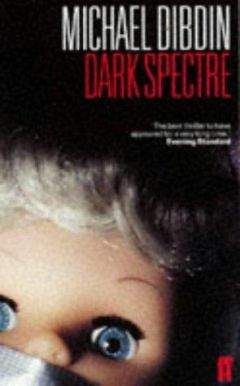Michael Dibdin - Dark Specter

Помощь проекту
Dark Specter читать книгу онлайн
Maybe that was what held the group together. It’s hard, in retrospect, to see what else we had in common. Even calling it a group is misleading. We were just a bunch of guys who liked to hang out together. The membership was never clearly defined. The basic core-Greg, Sam, Larry, Vince and me-was more or less stable, but it also included a temporary assortment of girlfriends, buddies, hangers-on and anyone who happened to be crashing at our pad at the time.
We were all young, of course, but so was everyone else back then. Greg, Sam and I were all connected in one way or another with the university, but the links were so tenuous and diverse that this too is a false trail. Greg had been an athlete, a college football star, but had been dropped from the team in his second year following a much-publicized drug bust. Sam had studied English for two years-we’d taken some classes together, which is where we met-before dropping out to complete his studies at the University of Life, while I was in my third year of Comparative Literature.
As for Larry and Vince, they came from other worlds altogether. Larry worked for a painting contractor, and got home every night covered in specks and streaks of various hues, stoned out of his mind on paint thinner. Vince’s means of support remained a mystery. We suspected that he was subsidized by his parents, but that was not something you could either admit or inquire about in those days. He spent most of the day fiddling with a bank of stereo equipment he had put together from kits and spare parts, which provided a mind-numbing volume of sound that was the envy of our friends and the despair of our neighbors.
What brought us together originally was the house. It was a pleasantly decrepit wood-framed place with an overgrown yard and a huge maple out front, in a run-down blue-collar neighborhood south of the river. Many lots had been demolished and rebuilt as condos or walk-ups, and the surviving older houses had a provisional, doomed look accentuated by lack of care and upkeep. Respectable renters steered clear of such properties, but the combination of low rent and no hassle was just what we were looking for. The landlord, an old Swede, was waiting for some redevelopment company to make him an offer he couldn’t refuse, and he didn’t much care what we did with, to, or in the house just as long as the rent was there on time every month.
It’s all part of the general pattern that the guy who originally found the place didn’t go on to become a member of the group at all. He was a dour jock who’d been a wide receiver on the same team as Greg, but had now graduated and was working as a salesman at a Dodge dealership. He and a coworker took the house and invited Greg to share it with them. Greg brought in Sam, who in turn mentioned the place to me. I was living with a girlfriend that year, but I was looking for an excuse to break up so I said I’d give it a try.
The arrangement was doomed from the start, of course. The two car salesmen may have looked and sounded very much the same as us when we met them over a beer one Saturday night, wearing their weekend tie-dyes and faded Levis, but they had in fact crossed the shadow line which separated our floating world from the uncompromising grid of straight society, and were none too happy about this transition. Monday through Friday they had to be up at seven, showered and shaved, suited and wide-tied, and get out there and move stock. Their servitude was thrown into sharp relief by our anarchistic lifestyle, and they tended to react particularly badly when we staggered back in from an all-night party just as they were leaving for work, or decided to play The Who Live at Leeds at the appropriate volume around three in the morning.
But what brought things to a crisis was the question of drugs. We had a fairly large stash of these on hand at any given time, mostly pot and hash, but also more exotic treats. This gave the car salesmen the jitters. If the house got busted, their careers would be over before they’d started. At first they came on heavy and tried to enforce a ban, but there were three of us and only two of them, plus we had the advantage of being able to drop some uppers to improve our attitude, or toke up and mellow out if the vibes got too heavy. It must have been a bitch. They finally gave up and moved out to a squeaky-clean high-rise near the dealership, leaving us to find replacements quickly to make up the next month’s rent. Larry turned up on the first trawl-he’d been to school with Sam and they used to shoot pool together once in a while-along with another guy who didn’t last, and the following month Vince materialized from somewhere, I still don’t know how or why, and stuck.
Such a casual, disparate grouping seems pretty unlikely now, yet at the time none of us thought twice about it. Later, looking back nostalgically from the far side of my own shadow line at that lost world of ease and excitement, I spent a lot of time trying to figure out just what it was that made the whole thing work. I can’t speak for the others, but I think I know what drew me to them: a passion for the tawdry and the transient, a weakness for the power not just of cheap music but of cheap emotion, cheap ideas and cheap thrills of every kind.
To Greg and Larry, all this came naturally. It was where they had grown up, a language they had spoken all their lives. With Vince it was a little more forced. He never talked about his parents, but one or two comments he let drop in unguarded moments suggested that he’d been raised in the kind of small-town home where they subscribed to the New Yorker and listened to the live broadcast from the Met every Saturday morning. He had to work his catechism of popular culture, but did so with all the zeal of a recent convert. For Sam, the journey had been even longer. His parents had permitted only one book in the house, the family Bible, and regarded television and popular music as works of the Devil. Even the radio was only turned on for farm bulletins and religious broadcasts on Sunday.
But despite their differences, the other four were merely expressing or reappropriating a culture native to them. They were Americans. So was I, on paper. I had been born in Maine and carried an American passport, but none of this made me an American, in my own eyes at least. My father had been European marketing director for a Boston-based company, and from the age of six to eighteen I lived and went to school in Holland, Switzerland and France. Despite summer vacations back in the States, when I enrolled at the University of Minnesota, I felt a foreigner in my own country.
So my association with Sam, Vince, Greg and Larry meant more than just a good time. At the risk of sounding pompous, it was a rediscovery of my roots, an affirmation of my identity. I was discovering for the first time the unique experience of American low taste, the authentic, unexportable cultural product. I reveled in its shameless excess, its triumphant vulgarity, and looked to the others as my guides through a heritage I possessed in name only. They were naturally flattered by this, and the fact that I embodied various qualities which they aspired to-a classy veneer of sophistication and cosmopolitanism-helped soothe any tensions which might have arisen from our differences in other respects.
That Saturday night at the Commercial was a good example of the way the relationship functioned. As I said, the bar at that hotel was notoriously the roughest and scuzziest in town. The bouncers at the door checked the ID of anyone who looked remotely under age, but that and money were all you needed to get in. You ordered a tableful of beers from one of the hard-faced waitresses, and as long as you drank up and didn’t get too rowdy, no one would bother you. The noise level was pretty high, particularly when the band started up, but the bouncers ensured that there was very little real trouble. Occasionally a pack of frat boys running the trapline would start making assholes of themselves, but that was just local color, like the hookers who trolled the bar between glasses of Seven-and-Seven.
So there we were, that Saturday night, sitting around a table of half-drunk brewskis and discussing what theologians term the Problem of Evil. There was nothing unusual about this. When it came to conversation, we went straight from the trivial to the cosmic without batting an eyelid. We could spend hours discussing what kind of pizza to order, or rehashing the plot lines of old movies, and then move right on to such topics as the meaning of life or the theory of reincarnation. We were equally at home with the sublime or the ridiculous. It was the stuff in between we didn’t have any time for, the earnest middle ground of the straight world with its rules, regulations and responsibilities.
Drugs had a lot to do with this, of course. People who weren’t part of that scene often don’t realize that it was governed by a code of etiquette every bit as rigid as a Long Island dinner party. If a fellow-tripper decided that some object in the room-an ashtray, say-was of intense beauty and significance, it was simply not done to point out that it was just a fucking ashtray, for Christ’s sake. On the other hand, if someone brought up the fact that the toilet kept overflowing, or that the electricity would be turned off if we didn’t pay the bill, he would immediately be told to stop heavying everyone out. It was considered gauche in the extreme to mention practical problems or future arrangements, but absolutely OK to raise the question of the origins of the universe, or to argue for hours about whether the physical world has an existence independent of our perceptions of it.
So there was nothing out of the ordinary about our discussion that evening at the Commercial. It was a television news item which sparked the whole thing off. At home we almost never watched the news, considering it to be a propaganda tool of the military-industrial complex designed no less than its Soviet equivalent to manipulate and suppress the truth. But there was a TV set in the bar to entertain patrons while the band took a break, and this particular report had gotten to us. Sure, it was another repressive preemptive strike at the drug culture of which the power-trippers in Washington were rightly terrified, but it also related to issues which directly concerned us, and we had to talk it out.
Here’s what happened. A single mother living in some tenement in New York set out to bathe her baby. Since there was no running hot water, this involved heating a pan of water on the stove. The mother in question was a junkie, which gave us an out to some extent. We didn’t approve of hard drugs, although if anyone had managed to score some cocaine we would have given that a try because word was it wasn’t physically addictive. But heroin, no way. We were drug users-radical, innovative individuals for whom illegal substances were just one more tool in the unending search for personal growth and enlightenment. People who took heroin were mindless addicts. The distinction in our minds was absolute.
Anyway, while the mother is waiting for the water to heat, she decides to fix up. When the water is nice and warm she pops her six-month-old in the pan, only unfortunately she forgets to turn off the burner. I think it was this simple domestic detail which got to us. It was the kind of thing we were doing all the time. None of us would forget the night Larry set the kitchen on fire when he got the munchies and started to fry up some food, then switched trips and wandered off leaving the pan on the stove. But there were five of us, and at least one usually had his head straight enough to keep track of what was going on. The woman in New York wasn’t so lucky. She was alone, and she’d miscalculated the dose when she fixed up. Result, she passed out and the baby was boiled alive.
OK, it was a real bummer, whichever way you looked at it, but any other time we’d have had a moment of silence and moved on. These things happen, life’s a bitch, gotta keep on truckin’. But that evening, for some reason, we all got hung up on this thing. Maybe the grotesque nature of the tragedy had something to do with it. People getting boiled alive sounded like something from the Middle Ages, or some wacko late movie scenario. Plus the details were hard to work out. How big was the pan? Couldn’t the kid climb out? How much water was there? Why didn’t it drown? How long did it take to die?
The only way to exorcize all this was to find someone or something to blame. For the TV people there was no problem, of course. They blamed the mother, and the dealers who had supplied her habit. But even though we disapproved of heroin, and despised anyone who let themselves become enslaved to it, we couldn’t get off the hook that easily. We’d all been equally out of it at one time or another, and although dropping when alone was against our code, who was to say what we might have done if we’d had kids to raise and poverty to contend with and nothing else to ease the pain? There was no way we were buying into the newscasters’ smug, judgmental line.
But if the mother wasn’t to blame, who was? For a while it looked like society was going to take the rap. If the woman had been brought up in a caring, supportive, communal environment, like the indigenous peoples before the white man fucked everything up, this would never have happened. There would have been plenty of old people with time on their hands who were only too glad to look after chores like bathing babies, leaving the mother free to go out and get royally laid by a selection of superstuds like us. Plus she’d be living in harmony with nature, so she wouldn’t need drugs or other artificial stimuli to combat the colonialization of her mind by the propaganda machine of late-capitalist consumerism, right?
We had all more or less agreed on this solution when Sam put a new spin on the whole thing by bringing up the religious angle. This was a personal thing with him. He’d never talked much about his fundamentalist background until a couple of months earlier, when his mother was killed by an intruder at her home in Milwaukee. They caught the guy right away, a local loser who’d already done time for break-ins. Another conviction would send him to the pen for ten to fifteen, so he’d taken a gun along and, as guns will, it had gone off.
Sam had never given the impression of having much time for his parents. When he talked about them at all it was as a big joke, a couple of hicks given to quoting the “good book” and dwelling at great length on the moral failings of others, so we were surprised to see how hard he was hit by his mother’s death. His father had succumbed to cancer five years earlier, and his mother had begged Sam to attend the University of Wisconsin so as to be near her. He had been equally determined to keep his distance, but when the old woman died in such a shockingly gratuitous way he naturally felt guilty for having left her all alone in the house. Rather than admit this, however, he deflected his feelings into an all-out assault on God. His parents had given up everything for Him, laying waste to their lives, pursuing a scorched-earth policy lest Satan find a crumb of comfort, and what was their reward? His father was consumed by a slow and agonizing illness, his mother gunned down in a robbery gone wrong. Thanks a lot, God.
So Sam’s line on the boiled baby story was fairly predictable: it was just one more proof that the idea of a wise, loving, all-powerful God was a crock of the ripest bullshit, and that anyone who believed in Him was mentally deficient and in dire need of counseling. We’d heard all this before, and duly nodded, murmured “Right on!” and reached for another beer. Then Larry, who hadn’t said anything much up to then, suddenly broke out, “I believe in God anyway.”























